This article previously appeared on Crossfader
We’re here to tell you what’s hot and what’s not in this week’s music roundup
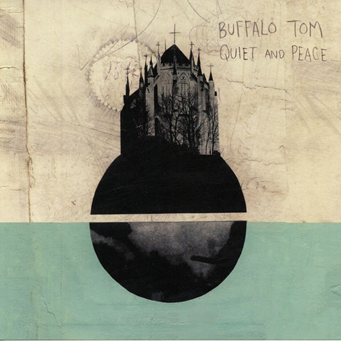
Buffalo Tom – QUIET & PEACE
Genre: College Rock
Favorite Tracks: “All Be Gone,” “Lonely Fast and Deep,” “Slow Down”
There must be a name for that post-Replacements sound, but I can’t quite come up with it. In so many instances it was just an evolution of R.E.M.’s reinterpreted Southern rock, and I know we call it “college rock,” but that phrase tends to be too broad and, oftentimes, too eclectic. Mainstream or indie, that sound is essential to many of my earliest memories—memories that Buffalo Tom didn’t occupy for me personally, but that they may as well have. But that sound FEELS a million years old, even when its being made in modern times, and it’s looked good on some artists and bad on others. Dave Hause notably released an overly polished take on it last year with BURY ME IN PHILLY that just never quite felt loose enough, and Tommy Stinson’s side project Bash & Pop reunited to put out the surprisingly excellent ANYTHING COULD HAPPEN, but that Midwestern alternative rock that could be felt in the indie scene with acts like Juliana Hatfield and Teenage Fanclub, and would be fully capitalized on with acts like Soul Asylum, Gin Blossoms, and a slew of other ‘90s hit makers, has mostly been abandoned by anyone who wasn’t producing it to begin with.
That that sound isn’t even remotely en vogue certainly makes Buffalo Tom’s QUIET AND PEACE, their first album in seven years, feel fresh. Just as it was for Stinson and Hause last year, no one seems to be putting out this brand of rock music to any kind of fanfare, but this cow-punkish, Southern-adjacent new-era dad rock is just as fun as it was nearly 30 years ago, even if somewhere along the way people became disenfranchised with this sound. QUIET AND PEACE is unquestionably made by men who have been doing this for a while, but it never falls into a going-through-the-motions staleness. In preparation for this review, I went back and listened to those early Buffalo Tom albums—notably BIG RED LETTER DAY, BIRDBRAIN, and LET ME COME OVER, and the scrappiness of their music just pops off the record. It’s easy to see how these guys, while ostensibly an indie rock band, fell into the post-Nirvana record industry cash and would get lumped in opening with an (arguably) less cool radio titan like Counting Crows. QUIET AND PEACE is a document of survival in so many ways, a quality album that, while decidedly less scrappy, still hits a lot of the same notes as their earlier albums with songs that have aged into themselves really gracefully. The concept that their debut was 30 years ago isn’t lost on lead singer Bill Janovitz, who uses the opener “All Be Gone” to really acknowledge that very distance: “Seems like I was just a kid not so long ago / So many arrivals / So many hellos / Now my time behind is greater than my time ahead.” A down-in-the-mud rock song like “Slow Down” is the kind of thing my dad would be playing on the stereo while he was doing work in the backyard, and I can’t help but wonder if the ‘90s era of dad rock is just this. QUIET AND PEACE is a good late career Buffalo Tom record, and for those that like this style of music, it’s likely an oasis in the modern rock pantheon. [CJ Simonson]
Verdict: Recommend

The Decemberists – I’LL BE YOUR GIRL
Genre: Indie Pop
Favorite Tracks: “Once In My Life,” “Sucker’s Prayer,” “We All Die Young”
There’s a large community of internet dwellers that really fucking hate this album, but I find it difficult to view it as anything less or more than harmless. The Decemberists were one of the more precocious and indulgent flagships of the mid-aughts indie boom, and while their baroque tendencies sound outdated and fuddy-duddy when revisiting the one-two punch of PICARESQUE and THE CRANE WIFE in 2018, they’re still an act that can craft unassuming and generally enjoyable slices of indie pop when they put their minds to it. Unfortunately, the first half of I’LL BE YOUR GIRL mostly grounds itself with intensely forgettable, albeit it competent, retreads of past highlights, culminating in the one unrepentant stinker on the album, the nauseatingly asinine “Everything Is Awful,” a quintessential phone-in from a former indie titan cashing in cuts for a paycheck. That being said, the latter half notably picks up stride, with “Sucker’s Prayer” and “We All Die Young” serving up a rollicking, near-bar band sensibility that is an unexpected treat. The most polarizing element on I’LL BE YOUR GIRL is an encroaching element of synthpop, but these concerns are mostly paranoid, things mostly being relegated to the stellar opener “Once In My Life,” and if anything, the listener’s left with a desire to hear more experimentation. While functional, the nostalgic throwback of “Rusalka, Rusalka / Wild Rushes” is too comfortable to pack a punch, and functionality’s still the overarching name of the game. It’s nice to see The Decemberists still out here doing it, but there’s a laundry list of albums you should hear from 2018 before this one. [Thomas Seraydarian]
Verdict: Do Not Recommend
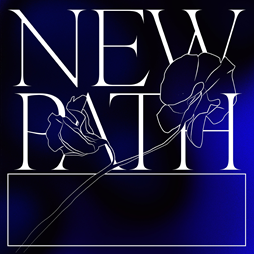
Essaie Pas – NEW PATH
Genre: Minimal Synth
Favorite Tracks: “Les Aphides,” “Futur Parlé,” “Substance M”
The past few years have established electronic as the umbrella genre with the most upward mobility and progression, but even such, few releases come out sounding like Montreal duo Essaie Pas’ NEW PATH. A return to minimal synth, one of the ‘80s most detached and Arctic comments on technological dystopia, hints of the genre have popped up in some of the recent revisitings of coldwave, but NEW PATH is a fully committed aesthetic manifesto. To be clear, Essaie Pas are not interested in welcoming you into their world of whirring efficiency and assembly line march-steps with open arms; the entire point of NEW PATH is the divide between man, machine, and the uneasy consideration of how clinical programming affects and relates to the natural human joys of dance and movement. Bolstered by a punishing low-end mix and touches of spacious dub production, NEW PATH is an antidote to the neon-tinged navel-gazing that has dominated a good portion of the pop culture discourse of recent memory. If Kraftwerk’s master tapes were infected with an ancient evil and invaded the air waves, you’d have something comparable to what Essaie Pas are doing here. That may not be the preferred cup of tea of many, but it’s unlikely 2018 will yield anything similar. [Thomas Seraydarian]
Verdict: Recommend
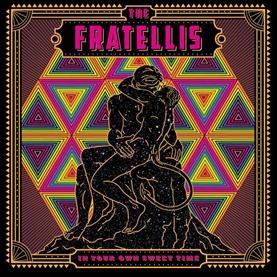
The Fratellis – IN YOUR OWN SWEET TIME
Genre: Indie Rock
Favorite Songs: “Starcrossed Losers,” “I’ve Been Blind,” “Indestructible”
What is it about iPod commercials and their choice of skin-crawlingly sleazy bands that represented the most populist, critically reviled aspects of 2000s rock revivalism? First there was Jet with “Are You Gonna Be My Girl?,” then there was The Fratellis’ “Flathead,” and both made you question whether a band or an ad executive made them. Over the next 11 years, the Scottish jock’n’rollers have tried to bury their plastic, one-note songwriting under an increasingly bloated musical palette of garage rock, disco, and orchestra-backed lounge music, like a student changing the font and claiming it’s an entirely different paper. IN YOUR OWN SWEET TIME hits with the same tempo and impact throughout, and every song follows the same pattern from an opening melodic jangle to an anthemic chorus. It works when Jon Fratelli sings with more charm and earnestness over the sweet guitar and violins of “Starcrossed Losers” and the steady plucks and build of “I’ve Been Blind.” However, he usually has little control over his falsetto and delivers lyrics like a terrible pick-up line to the 15th girl of the night, which can work when the surrounding instrumentation is raw and dirty. Over a more glitzy, soulful, and expansive sound, it’s incredibly dissonant and indicative of how the band’s songwriting and emotions have not matured as much as their music. There’s a place in this world for bands that have no ambition beyond being the soundtrack to watching football in a British pub, but it’s not like there’s a shortage of appropriate, better ditties, even from The Fratellis themselves. [Blake Michelle]
Verdict: Do Not Recommend
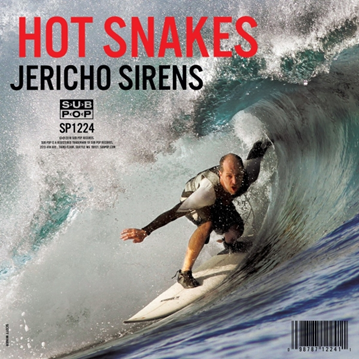
Hot Snakes – JERICHO SIRENS
Genre: Post-Hardcore
Favorite Tracks: “Six-Wave Hold-Down,” “Jericho Sirens,” “Death Doula,” “Psychoactive”
Hot Snakes have decided to return after 12 years alongside Quicksand, At-the Drive In, and American Nightmare, punk rockers whose careers were tragically cut short by internal tensions or the simple exhaustion of being a punk. Their comebacks have ranged from surprisingly refined and expanded to disappointingly safe, and I didn’t have high expectations for this one. Hot Snakes were never as dirty, tight, and heavy as Quicksand, pursuing a middle lane between D.C. noise rock and California melodic skate punk that was certainly unique but not especially engaging. I was curious why, out of all the projects Jon Reis and Rick Froberg have been a part of, they chose to reboot the most straightforward one. Whatever the reasons, JERICHO SIRENS is a little one-dimensional but a surprisingly strong return. Froberg’s delivery is a lot more throaty and unhinged than on past material, selling what might otherwise be rather repetitive lyrics on “I Need a Doctor” and “Death Doula” with raw intensity. The guitars are more barbed and crunchy than ever, with Reis and Froberg working incredibly well together on lead and rhythm and not falling into the repetitive, monochromatic downstroking that turned me off of previous records. Their contributions are distinct and powerful thanks to mixing that also lets Froberg’s voice stand out a bit more and keeps the drums from overtaking everything and robbing songs of any interesting rhythms. It’s a balance of punk spontaneity and intricate, dynamic riffage that Hot Snakes always aimed for, but hadn’t succeeded at until now. Those who found Quicksand’s INTERIORS too concerned with atmosphere and lacking in pure rock’n’roll swagger will find plenty to love here. [Blake Michelle]
Verdict: Recommend
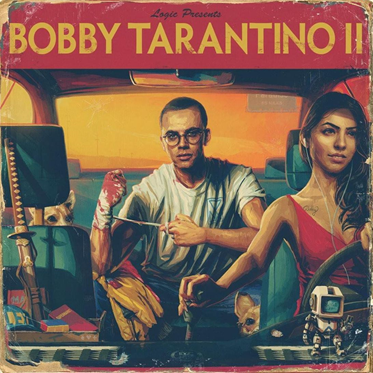
Logic – BOBBY TARANTINO II
Genre: Pop Rap
Favorite Tracks: “Overnight,” “Yuck,” “Wassup (featuring Big Sean)”
I have not been so conflicted when listening to an album in a very long time. When it comes to Logic, many of his past works have not grabbed me in the slightest, feeling far too bloated, cheesy and above all, corny. When it comes to pure, unaltered rapping ability and technical flows, Logic never disappoints. With Robert Bryson Hall II’s constant, whip-fast quips and bars, he obviously has the chops to be a solid MC, yet . . . my primary issue with his work was not how he raps, but with what he raps. His overly positive and seemingly fake enthusiasm grew thin on me quickly and left many projects feeling like PBS daytime specials. Some of the same issues and inconsistencies carry over to BOBBY TARANTINO II, yet despite all that, it is honestly the first Logic project I have somewhat enjoyed.
The mixtape begins with an unexpected but understandable skit featuring Justin Roiland, voice and co-creator of RICK AND MORTY. On “Grandpa’s Space Ship,” a slightly self-serving and narcissistic skit that serves a purpose unlike most filler skits of today, he lays out exactly why BTII stands higher than many of Logic’s albums, with Rick saying, “I’m not in the mood for a message / I’m looking to turn some shit up” (referring to Logic’s often message-heavy projects). “Overnight,” the first track on the project, is easily my favorite, with wobbly chiptune-like synths and a rapid 808 beat sputtering around in background. This instrumentation lends itself well to bar-after bar of Logics braggadocious lyrics. While he says nothing particularly profound or noteworthy, it is undoubtedly a catchy and undeniably fun rap track.
There are other moments that Logic goes a bit too overboard with “turning some shit up,” such as on “Wizard of Oz,” going from overly corny to overly shallow. Logic uses an unbearable and overdone autotune, so heavily layered on that he tries to justify through the lyrics, “I’m way too diverse to stay in one lane / Increase the autotune so y’all could feel the pain.” This corny lyricism in conjunction with the Future levels of production is frustratingly bad and really serves as a great example of Logic’s overall weakness: his blatant lack of self-awareness. All in all BOBBY TARANTINO II is a mixed bag with Logic still slipping into some of the pitfalls that held back many of his last projects from surpassing an overall “eh” feeling, but there is enough on this mixtape to write it off as just another cornball tape to add to the already growing collection. [Will Turmon]
Verdict: Do Not Recommend
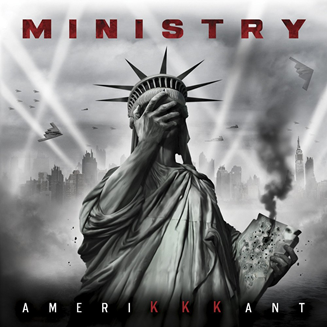
Ministry – AMERIKKKANT
Genre: Industrial Metal
Favorite Tracks: “I Know Words”
Oh, Ministry. As much as I love ‘em, the most consistent thing about them is just how inconsistent they are. Ministry have recorded some of the greatest industrial metal albums ever—that much can’t be argued. And, as it has been noted (some might say apologetically), many of those were released when a Republican held office, with genre landmarks THE MIND IS A TERRIBLE THING TO TASTE and PSALM 69 from the Bush years as proof. Well, with a Republican President as widely reviled as Trump, you’d think Ministry would have been mainlining some pure, uncut inspiration going into this one. Not so much, as it turns out. There are about a million reasons that could be offered up as explanation for this, but I’m just going to get down to brass tacks here: AMERIKKKANT, Ministry’s 14th studio album and first in five years, is not very good. If the album’s cringeworthy title and art aren’t enough of a red flag for you, the nine tracks ranging from forgettable to old hat will likely have you facepalming like Lady Liberty before they’ve finished playing out.
The first time around, “Wargasm” sounds like a welcome return to form for Ministry, nicely recapturing the band’s early-to-mid ‘90s sound. However, it also sounds suspiciously like a rather anemic take on Killing Joke’s “The Wait” upon a closer listen. In a similar vein, Ministry makes creative use of harmonica samples in “Twilight Zone,” calling to mind Led Zeppelin’s “When the Levee Breaks,” which is pretty cool . . . at least until you remember they did the same thing on “Worm” off of 2004’s HOUSES OF THE MOLE (itself a reference to ol’ Zep). And then there’s the riff that comes in around 2:45 which, despite being buried underneath several layers of horns, harmonicas and turntable scratches, sounds more than a bit like the central riff of “Wish” off Nine Inch Nail’s 1992 EP BROKEN. I’m splitting hairs here, but suffice it to say that much of the music on AMERIKKKANT isn’t very inspired or original, which is a shame considering the veritable social and political shitnado pouring out of Washington that Al has to pull from. After everything that has happened in the last year, I hoped to at least have a decent Ministry album to show for it. [Joseph Simpson]
Verdict: Do Not Recommend

Meshell Ndegeocello – VENTRILOQUISM
Genre: Psychedelic Soul, Neo-Soul
Favorite Tracks: “Smooth Operator,” “Don’t Disturb This Groove,” “Nite and Day,” “Sensitivity”
Meshell Ndegeocello—genre-hopping bassist, singer, songwriter, rapper, and original founder of neo-soul—was literally the last person I ever expected to release an album of covers. After all, she has never been the type to stay in her lane. But after a listen, it turns out that her new album VENTRILOQUISM is no exception. The songs test the boundaries between reimagining and reconstruction, arrangement and composition, but in ways that are more often exciting and engrossing than not. It’s worth listening all the way through, though at several spots the album drags, most notably at the beginning, where we get four contemplative, spacey, atmospheric tracks before anything seems to groove (a folk guitar-led rewrite of TLC’s “Waterfall” which, weirdly . . . works). But it’s worth the wait: we get the infectious bass and guitar lines that Ndegeocello’s skill set invited us to expect on George Clinton’s “Atomic Dog 2017,” an oddly fun shuffle groove take on Ralph Tresvant’s “Sensitivity,” and The System’s “Don’t Disturb This Groove.” The album saves its best for last, a truly special take on Sade’s “Smooth Operator,” sleekly produced with a tongue-in-cheek sports announcer style rendering of Sade’s introduction, and a highly syncopated drum groove that keeps you off balance, deftly follow by a haunting piano melody layered off of a bassline. Who needs lanes, anyway? Get this album. [Femi]
Verdict: Recommend

Palm – ROCK ISLAND
Genre: Math Rock
Favorite Tracks: “Composite,” “Dog Milk,” “Theme From Rock Island,” “20664”
I’m pretty bad at arithmetic. My high school “D” in algebra and the three math classes I’ve failed in my time as a college student have solidified my place among the ranks of some of the least talented mathematicians of our time. I think my wariness of numbers is what has always kept me from understanding the appeal of math rock. When I want goofy time signatures, I listen to bebop. When I want to hear how many crazy sounds a guitar can make, I listen to post-rock. When I want to hear a drummer solo over ambient noises, I plug in my MicroKorg, hit the arpeggiator, hop behind my drum kit, and proceed to annoy the living hell out of my neighbors while risking eviction. However, when Palm’s sophomore album ROCK ISLAND was left unclaimed in the Crossfader grid for almost a month, I decided to step up to the challenge of reviewing an album I have absolutely no way of understanding. I am, after all, an adventurous man, willing to conquer any obstacle put before me.
Now that I’ve listened to ROCK ISLAND, I’m still completely confused as to how people get really into this stuff. There were some cool moments on the album for sure. “Dog Milk” has an interesting steel drum sound played over some crazy time signature I don’t really care enough to identify. “Composite” features a crunchy guitar glissando that was pretty perplexing. “Theme From Rock Island” kinda sounds like a really bewildering Fantasy Guys, with a breezy guitar hook, video game synths, and a beat that blends live percussion and drum machines. After listening to the LP while eating some Popeyes, I can totally see the appeal of crazy left-field rock for some people, but I still can’t seem to wrap my head around how to actually enjoy it. Palm’s an exceptionally talented group of musicians, and ROCK ISLAND is clearly a very innovative album in its genre, even from the perspective of someone with a complicated relationship with the field of numerical music. I’m never going to understand why people love math rock so much, and this will likely be the only album in the subgenre I ever listen to in full. Nonetheless, if you are one of the many aficionados of dizzying rock and roll, do yourself a favor and listen to this album. And please, explain to me what I’m missing while you’re at it. [Ted Davis]
Verdict: Recommend
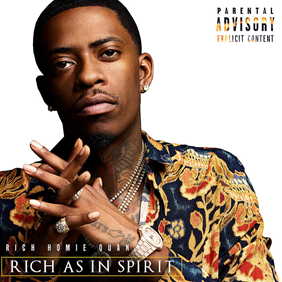
Rich Homie Quan – RICH AS IN SPIRIT
Genre: Trap Rap, Pop Rap
Favorite Tracks: “Reflecting,” “Achieving”
Rich Homie Quan is another surprising example of a hip hop artist with an illustrious name despite not having released a studio album until This Year Our Lord 2018. However, as I’ve referenced a handful of times with both Maxo Kream and Nipsey Hussle before him, there’s a lot to be said for striking while the iron’s hot, and not trying to cobble together something after 2014’s inimitable RICH GANG: THA TOUR PART 1 is likely a decision that Quan and his team will forever look back on with regret. Any way you slice it, RICH AS IN SPIRIT is a resolute and unchallenging maintenance of the status quo. Rich Homie Quan has always been an obvious co-conspirator of Young Thug due to their trademark preferences of melodicism over traditional bars. While I’m actually of the somewhat controversial opinion that Thugga’s a bit overrated, he at least remains a volatile energy. You see, the surface-level presentation of RICH AS IN SPIRIT is perfectly pleasant, a sort of lazy drift down an inebriated stream of illicit substances once the party’s clearing out circa 2 AM, but the album immediately declares its intent and rarely wavers from its tried-and-true formula apart from some very brief experiments in production on “Perfect Flower” and “Achieving.” Rich Homie Quan can rest easy knowing he’s aggressively cemented a signature sound that’s instantly recognizable, but his reticence in refusing to make any concessions in terms of style or adaptability is self-defeating. [Thomas Seraydarian]
Verdict: Do Not Recommend
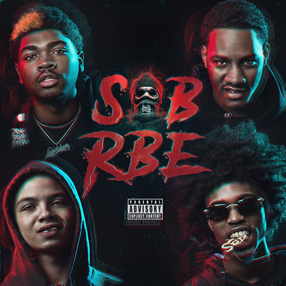
SOB X RBE – GANGIN
Genre: Hyphy
Favorite Tracks: “Anti Social,” “Always,” “The Man Now,” “Y.H.U.N.G.”
SOB X RBE (Strictly Only Brothers, Real Boi Entertainment) hails from Vallejo, California, the town that birthed legendary no-holds-barred rapper Mac Dre. Similar to Dre, SOB’s four members are rumored to have recorded many of their early tracks on crappy cell phone microphones and utilize the hard-hitting but danceable synth-based beats that the Bay’s hip hop scene in notorious for. However, Dre comparisons aside, the group is relatively innovative and is arguably the only notable new hip hop crew of the year so far. GANGIN is a cocky but authentic breakout that stays true to the regional roots that seem to define the crew’s notoriety while managing to eschew the consistency and insularity that makes the San Francisco area’s hip hop scene so unapproachable to outsiders. “The Man Now” is full of wisdom and arrogance with a hook that proclaims, “The only time you around is when you have your hands out” and “I’m the man now.” Unfriendliness is the overarching theme of the album, and SOB seem to genuinely not want any outsiders around their crew, despite Fader features and Pitchfork “Best New Music” industry cred. “Anti Social” is a disagreeable pump-up about not supporting inauthentic rappers and avoiding stans. Though the rappers behind the group often paint themselves in an antagonistic light, by doing so they stay true to the “strictly only brothers” ideal that they rep. SOB X RBE isn’t out here trying to win over critics or build their fanbase, but in doing so they’ve landed themselves on a label and broken into one of the most disparaging musical circles on the Internet.
GANGIN isn’t without its flaws, though. The album sticks to a formula and tends to bleed together. Apart from a few standouts, every song pretty much sounds the same, and when I’ve tried to play the album for my friends, all of them have been pretty ambivalent toward it. Many of the hooks often sound more like Jeremih than the hardened rappers that SOB tries to play themselves off as. Though I’ve enjoyed parts of the release, every time I listen to it I find myself questioning whether I genuinely enjoy it or if I’m convincing myself I like it because many of my favorite critics have given GANGIN clout. However, qualms aside, I don’t really think SOB X RBE cares what a private school student wearing a vintage button down in Los Angeles thinks of their music, and that is why I appreciate the album, even if it didn’t fully live up to my expectations. I’m interested to see what the posse chefs up next, and there’s certainly potential for more gripping releases in the future. If you like West Coast rap, GANGIN is worth a listen, but don’t expect to hear anything that sounds fully realized quite yet. [Ted Davis]
Verdict: Recommend
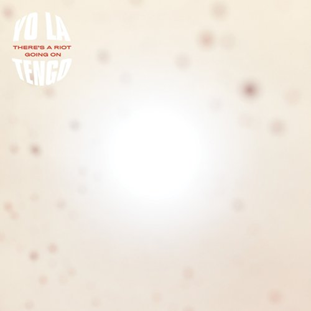
Yo La Tengo – THERE’S A RIOT GOING ON
Genre: Indie Rock
Favorite Tracks: “For You Too,” “Polynesia #1,” “Dream Dream Away,” “Let’s Do It Wrong,” “Here You Are”
No band has explored the range between loud and soft quite like Yo La Tengo, praise that comes from a 30+ year career that has seen them flip between noisey jam sessions turned up to 11 and gentle, beautiful ballads praising the small corners of the world with masterful accord. THERE’S A RIOT GOING ON is the bands quietest album in a long time, a comforting juxtaposition to an outside world that’s followed the band’s lead in turning itself up to 11. As the world has gotten noisier since the band’s blissful 2013 release FADE, here they dial things back in both song structure and intensity. FADE fell somewhere in the middle of the spectrum of Yo La Tengo’s duality (part of what made it one of that year’s best albums), but THERE’S A RIOT GOING ON rarely raises itself above a whisper, and I mean that quite literally. While Georgia Hubley’s vocals have soundtracked some of the bands most delightfully quaint and scaled-back songs (“You Can Have It All,” “Nowhere Near,” “Today Is The Day”), she spends much of this new album doing work over tracks that are reserved even by Yo La Tengo standards. The band rarely raise their voice, refusing to match the level of rioting that’s going on outside, and on Hubley’s four tracks, she provides a calm and serenity that sets the tone for the whole project. THERE’S A RIOT GOING ON is Hubley’s album, much more than it is Ira Kaplan’s, but it’s also filled with musing instrumentals and long, measured musical passages, spending much of its time contently wandering without two of indie rock’s most consistent voices. At 15 songs, many of which stretch over five minutes, there’s a kind of rudderless free fall that’s being explored here, not through feedback and guitar solos as we’re accustomed to, but through something more simple and ethereal, like searching guitar strums (“Dream Dream Away”) or stand-up bass and doo wop background vocals (“Forever”). The album delivers a meditative exercise, something Yo La Tengo are certainly no strangers to creating, but this time carried out in a way that actually accomplishes some semblance of inner peace rather than merely providing a thoughtful path. About as quirky and peppy as the album gets is the spicy muzak interlude “Esportes Casual,” but even that is brief, odd, and relatively low key. I once wrote about how I wouldn’t pretend to be an expert about Yo La Tengo, and THERE’S A RIOT GOING ON beautifully pushes the band to new arenas, bringing their ever-expanding and diverse career to newer, more peaceful corners of the world. We’re lucky to have them around. [CJ Simonson]
Verdict: Recommend





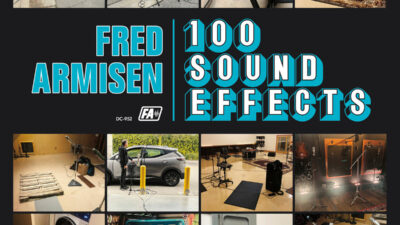





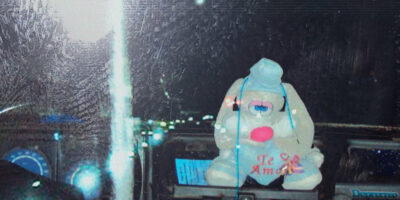




Comments